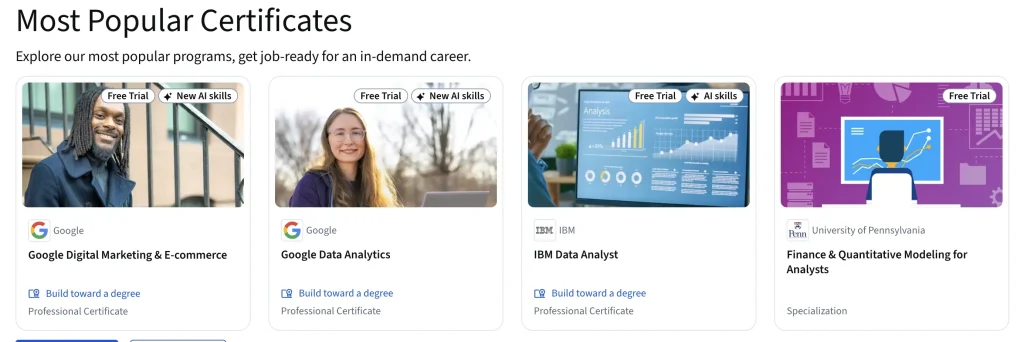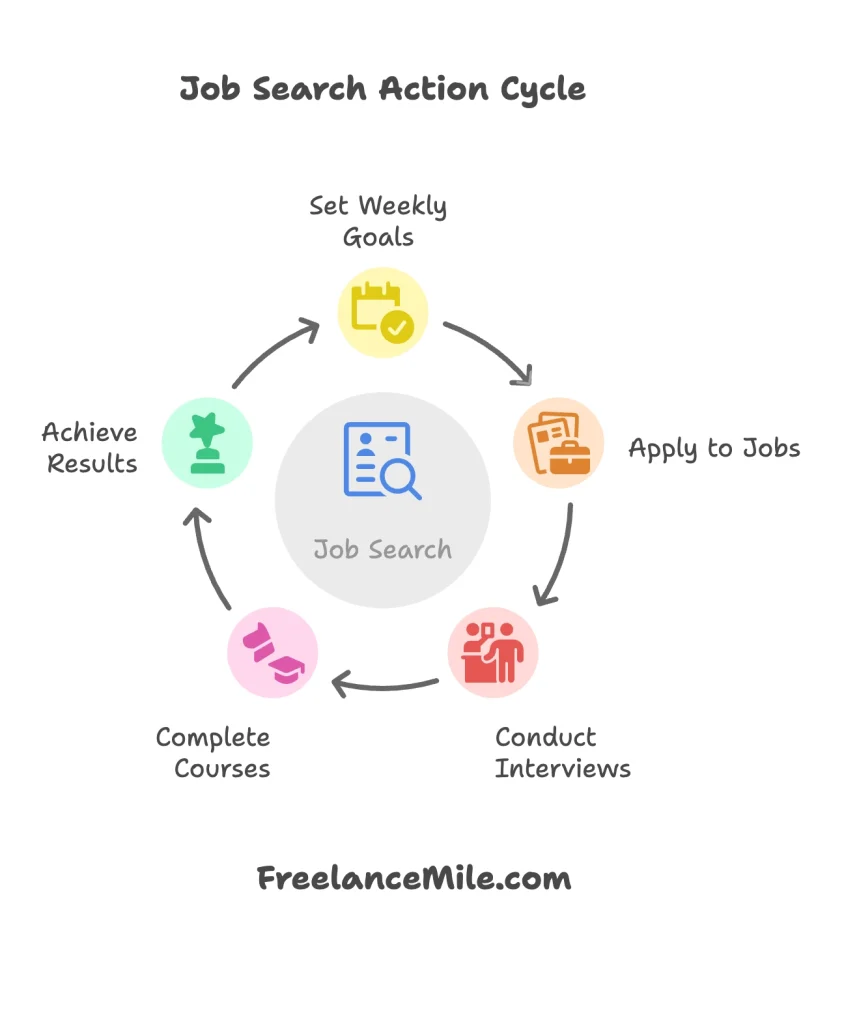Three years ago, I was sitting in my cubicle, watching the clock tick by at 2:47 PM on a Tuesday afternoon. That’s when it hit me – I was counting down the minutes until I could escape a job that drained my soul.

Sound familiar? You’re not alone in this struggle.
After spending over a decade in digital marketing, I’ve learned that knowing how to find a job you love isn’t just about luck or having the right connections.
It’s about understanding yourself, being strategic, and taking deliberate action toward work that actually energizes you instead of exhausting you.
The good news? Finding a job you love is absolutely possible when you know the right approach.
Let’s check them out!
Key Takeaways
- Reflect on Your Core Values – Know what matters most to you in your work and life.
- Discover Your Strengths – Identify what you’re naturally good at and enjoy doing.
- Explore Career Paths – Research both traditional and emerging fields, and talk to people already doing the work.
- Build Relevant Skills – Close any skill gaps with online learning and hands-on projects.
- Network Effectively – Build genuine relationships to uncover hidden job opportunities.
- Research Companies and Roles – Go beyond job descriptions to find the right organizational fit.
- Take Action and Stay Motivated – Make a plan, stay persistent, and celebrate your progress.
Understanding What You Really Want
Before jumping into job applications, you need to get crystal clear on what makes you tick. This isn’t about what your parents want or what society expects – it’s about YOU.
Identifying Your Core Values

Your values are like your internal compass. They guide every decision you make, including career choices.
Take some time to think about what matters most to you. Is it work-life balance? Creative freedom? Financial stability? Making a difference in the world?
I remember when I first started my career, I thought money was everything. But after landing a high-paying job that left me miserable, I realized that alignment with my values was way more important than a fat paycheck.
Discovering Your Natural Strengths
We all have things we’re naturally good at. Maybe you’re great with people, have an eye for detail, or can solve complex problems without breaking a sweat.
The key is to identify these strengths and find roles that let you use them daily. When you’re working in your strength zone, work doesn’t feel like work – it feels like play!
Consider taking a strengths assessment like the one offered by Gallup StrengthsFinder to get clarity on your top talents.
Exploring Different Career Paths
Once you know yourself better, it’s time to explore what’s out there. The job market in 2025 is more diverse than ever before!
Traditional vs. Modern Career Options
Gone are the days when you had to choose between being a doctor, lawyer, or teacher. Today’s job market includes roles that didn’t exist five years ago.
Think about fields like AI prompt engineering, sustainability consulting, or remote work facilitation. These are real careers with real opportunities.
Don’t limit yourself to traditional paths if they don’t excite you. The Bureau of Labor Statistics reveals that numerous of the fastest-growing occupations are in emerging fields.
The Power of Informational Interviews
Here’s something most people don’t do but should: informational interviews. These are casual conversations with people working in roles or companies that interest you.

Reach out to professionals on LinkedIn & request for 15-20 minutes of their time. Most people are happy to share their experiences & insights.
I’ve done dozens of these throughout my career, and they’ve given me insights I never would have gained otherwise. Plus, they often lead to unexpected opportunities!
Building the Right Skills
Having the right skills is like having the right key – it opens doors that would otherwise stay locked.
Identifying Skill Gaps
Look at job descriptions for roles you want and make a list of required skills. Then honestly assess where you stand.
Don’t panic if you’re missing some skills – everyone has gaps! The important thing is to create a plan to fill them.
Online Learning Platforms

The internet has made skill-building more accessible than ever. Platforms like Coursera, LinkedIn Learning, and Udemy offer courses on virtually every topic imaginable.
I’ve personally used these platforms to stay current with digital marketing trends and learn new skills. The best part? You can learn at your own pace, often for less than the cost of a nice dinner out.
Practical Experience Through Projects
Don’t just consume content – create it! Construct a portfolio of projects that showcase your skills.
If you want to get into web design, create websites for local businesses. Interested in marketing? Create a blog or run social media campaigns for nonprofits.
Real-world experience beats theoretical knowledge every time.
Networking Your Way to Opportunities
Here’s a truth bomb: 85% of jobs are filled through networking, not job boards.
Building Genuine Relationships
Networking isn’t about collecting business cards or sending spammy LinkedIn messages. It’s about building genuine relationships with people in your field.
Start by being helpful to others. Share useful content, make introductions, and offer assistance when you can. The opportunities will follow naturally.
Professional Associations and Events
Join professional associations connected to your field of interest. Attend conferences, workshops, and meetups (both virtual and in-person).
These events are goldmines for meeting like-minded professionals and learning about opportunities before they’re publicly posted.
Researching Companies and Roles
Not all jobs are created equal, even within the same field. That’s why research is so important.
Company Culture Investigation
Look beyond the job description and dig into company culture. Check out sites like Glassdoor to read employee reviews and get the inside scoop.
Also, pay attention to how companies present themselves on social media. Are they promoting work-life balance or just talking about grinding 24/7?
Understanding Growth Opportunities
Ask yourself: Where can this role take me in 2-5 years? Is there room for advancement? Will you learn transferable skills?
The best jobs aren’t just good for today – they set you up for an even better tomorrow.
Making Strategic Career Moves
Sometimes the path to your dream job isn’t direct. You might need to make strategic moves to get there.
Stepping Stone Positions
Don’t be afraid to take a role that’s not perfect if it gets you closer to where you want to be. Think of it as paying your dues and building experience.
I took several jobs early in my career that weren’t my dream roles, but each one taught me something valuable and opened new doors.
Side Hustles and Freelancing
Consider testing the waters with freelancing or side projects before making a full career change. This gives you experience and income while reducing risk.
Many successful career transitions start as side hustles that eventually become full-time gigs.
Overcoming Common Obstacles
Let’s be real – finding a job you love isn’t always smooth sailing. Here are some common roadblocks and how to overcome them.
The Experience Paradox
You know the drill: “We need someone with experience, but how do I get experience without a job?”
The solution? Create your own experience through volunteer work, internships, personal projects, or freelancing. Show, don’t just tell, what you can do.
Age and Career Change Concerns
Worried you’re too old to change careers? Think again! Research shows that career changes are becoming more common at all ages.
Your experience and maturity can actually be advantages in the right role.
Financial Pressures
Money worries are real, but don’t let them trap you in a job you hate forever. Create a transition plan that includes building an emergency fund and potentially taking a temporary pay cut for long-term happiness.
Remember, being miserable at work has costs too – to your health, relationships, and overall well-being.
Taking Action and Staying Motivated
Knowledge without action is just entertainment. Here’s how to keep moving forward.
Creating Your Action Plan

Divide your job search into manageable steps. Set weekly goals like “apply to 5 jobs,” “have 2 informational interviews,” or “complete one online course.”
Small, constant actions add up to big results over time.
Dealing with Rejection
Rejection is part of the process – even for the most qualified candidates. Don’t take it personally, and don’t let it stop you from trying.
Each “no” is practice for the eventual “yes.” Keep refining your approach and stay persistent.
Celebrating Small Wins
Acknowledge progress along the way. Got a phone interview? Celebrate! Made a new professional connection? That’s worth recognizing too!
These small wins keep you motivated during the longer journey.
Conclusion
Learning how to find a job you love is one of the most important skills you can develop. It’s not about finding the “perfect” job (spoiler alert: it doesn’t exist), but about finding work that aligns with your values, uses your strengths, and gives you opportunities to grow.
The journey might take time, and there will be challenges along the way. But imagine waking up excited about your workday instead of dreading it. Imagine using your talents to make a real impact. That’s what’s possible when you apply these strategies consistently.
Your dream job is out there waiting for you – you just need to know how to find it. Start with understanding yourself, build the right skills, network strategically, and take consistent action toward your goals.
The career of your dreams is closer than you think, and I can’t wait to share more strategies to help you get there in future posts!







